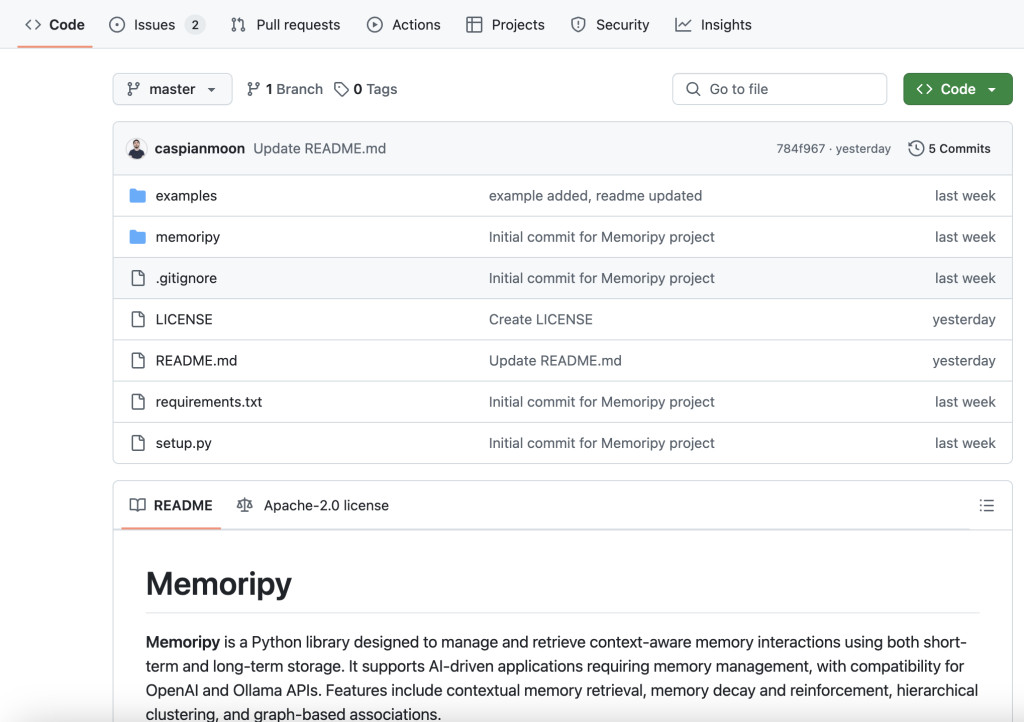

Artificial intelligence systems often struggle with retaining meaningful context over extended interactions. This limitation poses challenges for applications such as chatbots and virtual assistants, where maintaining a coherent conversation thread is essential. Most traditional AI models operate in a stateless manner, focusing solely on immediate inputs without considering the continuity of prior exchanges. This lack of effective memory leads to fragmented and inconsistent interactions, hampering the ability to build truly engaging, context-sensitive AI systems.
Meet Memoripy: A Python library that brings real memory capabilities to AI applications. Memoripy addresses the problem of maintaining conversational context by equipping AI systems with structured memory, allowing them to effectively store, recall, and build upon prior interactions. Memoripy provides both short-term and long-term memory storage, enabling AI systems to retain context from recent interactions while preserving important information over the long term. By structuring memory in a way that mimics human cognition—prioritizing recent events and retaining key details—Memoripy ensures that interactions remain relevant and coherent over time.
Memoripy organizes memory into short-term and long-term clusters, enabling the prioritization of recent interactions for immediate recall while retaining significant historical interactions for future use. This prevents the AI from becoming overwhelmed with excessive data while ensuring relevant information is accessible. Memoripy also implements semantic clustering, grouping similar memories together to facilitate efficient context retrieval. This capability allows AI systems to quickly identify and link related memories, thereby enhancing response quality. Furthermore, Memoripy incorporates memory decay and reinforcement mechanisms, whereby less useful memories gradually fade, and frequently accessed memories are reinforced, reflecting principles of human memory. Memoripy’s design emphasizes local storage, which allows developers to handle memory operations entirely on local infrastructure. This approach mitigates privacy concerns and provides flexibility in integrating with locally hosted language models, as well as with external services like OpenAI and Ollama.
To illustrate how Memoripy can be integrated into an AI application, consider the following example:
from memoripy import MemoryManager, JSONStorage
def main():
# Replace 'your-api-key' with your actual OpenAI API key
api_key = "your-key"
if not api_key:
raise ValueError("Please set your OpenAI API key.")
# Define chat and embedding models
chat_model = "openai" # Choose 'openai' or 'ollama' for chat
chat_model_name = "gpt-4o-mini" # Specific chat model name
embedding_model = "ollama" # Choose 'openai' or 'ollama' for embeddings
embedding_model_name = "mxbai-embed-large" # Specific embedding model name
# Choose your storage option
storage_option = JSONStorage("interaction_history.json")
# Initialize the MemoryManager with the selected models and storage
memory_manager = MemoryManager(
api_key=api_key,
chat_model=chat_model,
chat_model_name=chat_model_name,
embedding_model=embedding_model,
embedding_model_name=embedding_model_name,
storage=storage_option
)
# New user prompt
new_prompt = "My name is Khazar"
# Load the last 5 interactions from history (for context)
short_term, _ = memory_manager.load_history()
last_interactions = short_term[-5:] if len(short_term) >= 5 else short_term
# Retrieve relevant past interactions, excluding the last 5
relevant_interactions = memory_manager.retrieve_relevant_interactions(new_prompt, exclude_last_n=5)
# Generate a response using the last interactions and retrieved interactions
response = memory_manager.generate_response(new_prompt, last_interactions, relevant_interactions)
# Display the response
print(f"Generated response:n{response}")
# Extract concepts for the new interaction
combined_text = f"{new_prompt} {response}"
concepts = memory_manager.extract_concepts(combined_text)
# Store this new interaction along with its embedding and concepts
new_embedding = memory_manager.get_embedding(combined_text)
memory_manager.add_interaction(new_prompt, response, new_embedding, concepts)
if __name__ == "__main__":
main()In this script, the MemoryManager Is initialized with specified chat and embedding models, along with a storage option. A new user prompt is processed, and the system retrieves relevant past interactions to generate a contextually appropriate response. The interaction is then stored with its embedding and extracted concepts for future reference.
Memoripy provides an essential advancement in building AI systems that are more context-aware. The ability to retain and recall relevant information enables the development of virtual assistants, conversational agents, and customer service systems that offer more consistent and personalized interactions. For instance, a virtual assistant using Memoripy could remember user preferences or details of prior requests, thereby offering a more tailored response. Preliminary evaluations indicate that AI systems incorporating Memoripy exhibit enhanced user satisfaction, producing more coherent and contextually appropriate responses. Moreover, Memoripy’s emphasis on local storage is crucial for privacy-conscious applications, as it allows data to be handled securely without reliance on external servers.
In conclusion, Memoripy represents a significant step towards more sophisticated AI interactions by providing real memory capabilities that enhance context retention and coherence. By structuring memory in a way that closely mimics human cognitive processes, Memoripy paves the way for AI systems that can adapt based on cumulative user interactions and offer more personalized, contextually aware experiences. This library provides developers with the tools needed to create AI that not only processes inputs but also learns from interactions in a meaningful way.
Check out the GitHub Repo. All credit for this research goes to the researchers of this project. Also, don’t forget to follow us on Twitter and join our Telegram Channel and LinkedIn Group. If you like our work, you will love our newsletter.. Don’t Forget to join our 55k+ ML SubReddit.
[FREE AI WEBINAR] Implementing Intelligent Document Processing with GenAI in Financial Services and Real Estate Transactions– From Framework to Production
The post Meet Memoripy: A Python Library that Brings Real Memory Capabilities to AI Applications appeared first on MarkTechPost.
Source: Read MoreÂ

